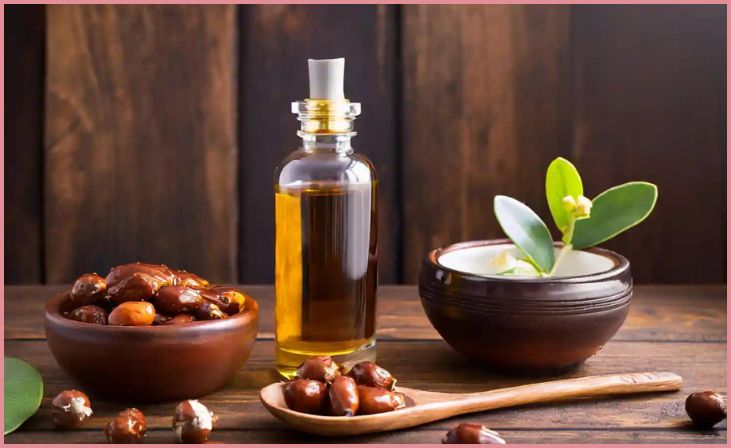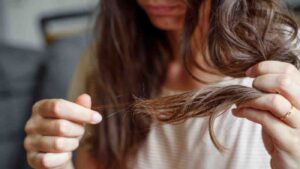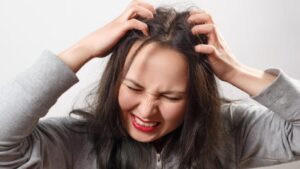In the quest for luscious locks, natural remedies often hold the key to unlocking vibrant, healthy hair. Essential oils, derived from plants, offer a potent solution to stimulate hair growth and maintain scalp health. In this guide, we explore the transformative power of 8 essential oils renowned for their effectiveness in nurturing hair follicles and promoting stronger, thicker strands.
From lavender to jojoba, each oil brings unique benefits to your hair care routine. Discover how harnessing the power of nature can revolutionize your hair care regimen, leaving you with the luxurious mane you’ve always desired.
Essential Oils for Stimulating Hair Growth
Here are some Essential Oils for Stimulating Hair Growth :
1. Lavender Oil

Lavender oil is renowned for its soothing aroma and therapeutic properties, making it a popular choice for promoting hair growth. Rich in antioxidants, lavender oil nourishes the scalp, improving blood circulation and stimulating hair follicles. Its antimicrobial properties help maintain scalp health, reducing the risk of dandruff and other scalp conditions that may impede hair growth.
Additionally, lavender oil has been shown to reduce stress and anxiety, which can indirectly benefit hair health by minimizing hair loss associated with stress. To incorporate lavender oil into your hair care routine, dilute a few drops in a carrier oil like coconut or almond oil and massage it into your scalp. Leave it on for at least 30 minutes before rinsing thoroughly for optimal results.
2. Rosemary Oil
Rosemary oil is prized for its ability to promote hair growth and prevent premature baldness. It contains carnosic acid, which helps improve circulation to the scalp, stimulating hair follicles and encouraging new growth. Additionally, rosemary oil has anti-inflammatory properties that soothe the scalp and reduce irritation, creating an optimal environment for hair to thrive.
Regular use of rosemary oil can also help strengthen hair, making it less prone to breakage and split ends. To reap the benefits of rosemary oil, mix a few drops with a carrier oil and massage it into your scalp. Leave it on overnight for a deep conditioning treatment or wash it out after 30 minutes for a quick boost of nourishment.
3. Peppermint Oil
Peppermint oil is well-known for its refreshing scent and cooling sensation, but it also boasts impressive benefits for hair growth. The menthol in peppermint oil stimulates blood circulation to the scalp, which in turn promotes hair follicle activity and encourages new growth. Additionally, peppermint oil has antimicrobial properties that help keep the scalp clean and free from dandruff-causing bacteria and fungi.
This invigorating oil can also help balance the scalp’s pH levels, reducing excess oil production and preventing clogged pores that can inhibit hair growth. To use peppermint oil for hair growth, mix a few drops with a carrier oil and massage it into your scalp. Leave it on for at least 30 minutes before shampooing as usual.
4. Tea Tree Oil
Tea tree oil is revered for its powerful antifungal and antibacterial properties, making it an effective remedy for various scalp conditions that may hinder hair growth. By combating dandruff, scalp acne, and other fungal infections, tea tree oil creates a clean and healthy environment for hair follicles to thrive. Its soothing properties also help alleviate scalp irritation and inflammation, promoting optimal conditions for hair growth.
Tea tree oil can be used in various hair care products, including shampoos, conditioners, and scalp treatments. Alternatively, you can dilute a few drops of tea tree oil in a carrier oil and massage it into your scalp. Leave it on for 15-20 minutes before rinsing thoroughly to enjoy its benefits.
5. Cedarwood Oil
Cedarwood oil is prized for its ability to balance oil production on the scalp, making it beneficial for both dry and oily hair types. By regulating sebum production, cedarwood oil helps prevent scalp conditions like dandruff and itching, which can hinder hair growth. Additionally, cedarwood oil has antimicrobial properties that help cleanse the scalp and prevent bacterial or fungal infections.
Its calming aroma also promotes relaxation, reducing stress levels that may contribute to hair loss. To incorporate cedarwood oil into your hair care routine, add a few drops to your shampoo or conditioner, or dilute it in a carrier oil for a scalp massage. Leave it on for at least 30 minutes before rinsing thoroughly for best results.
6. Thyme Oil
Thyme oil is rich in antioxidants and nutrients that nourish the scalp and strengthen hair follicles, promoting healthier, thicker hair growth. Its antimicrobial properties help combat scalp infections and dandruff, creating an optimal environment for hair to thrive. Thyme oil also improves blood circulation to the scalp, ensuring that hair follicles receive an adequate supply of nutrients and oxygen for optimal growth.
Additionally, thyme oil has a refreshing scent that invigorates the senses and promotes relaxation, reducing stress levels that may contribute to hair loss. To use thyme oil for hair growth, dilute a few drops in a carrier oil and massage it into your scalp. Leave it on for at least 30 minutes before shampooing as usual.
7. Clary Sage Oil
Clary sage oil is prized for its ability to regulate sebum production on the scalp, making it an excellent choice for oily hair types. By balancing oil levels, clary sage oil helps prevent clogged pores and scalp inflammation, which can inhibit hair growth.
Additionally, clary sage oil has antimicrobial properties that help keep the scalp clean and free from infections. Its soothing properties also promote relaxation and reduce stress levels, which can contribute to healthier hair growth. To use clary sage oil for hair growth, dilute a few drops in a carrier oil and massage it into your scalp. Leave it on for at least 30 minutes before rinsing thoroughly for best results.
8. Jojoba Oil

Jojoba oil closely resembles the natural oils produced by the scalp, making it an ideal moisturizer for both the hair and scalp. Its lightweight and non-greasy texture make jojoba oil suitable for all hair types, from dry and damaged to oily and prone to dandruff. Jojoba oil hydrates the hair and scalp, preventing moisture loss and promoting healthier, more resilient strands.
Additionally, jojoba oil contains vitamins and minerals that nourish the scalp and strengthen hair follicles, reducing the risk of breakage and promoting faster growth. To incorporate jojoba oil into your hair care routine, apply a few drops to damp hair or mix it with your favorite conditioner. Leave it on for at least 30 minutes before rinsing thoroughly for optimal hydration and nourishment.
Conclusion
In conclusion, embracing the natural potency of essential oils presents a holistic approach to nurturing healthier, stronger hair. With the versatility of oils like lavender, rosemary, and peppermint, you can address specific hair concerns while promoting overall scalp health. By incorporating these oils into your hair care routine, you not only stimulate hair growth but also indulge in the therapeutic benefits of aromatherapy.
Remember to exercise caution and dilute oils properly to avoid any adverse reactions. Embrace the journey of self-care and discover the transformative effects of nature’s remedies on your hair. With patience and consistency, you’ll soon unlock the full potential of your locks, radiating confidence and beauty from within.
Frequently Asked Questions
Are essential oils safe for all hair types?
Yes, essential oils are generally safe for all hair types when used in appropriate dilutions. However, individuals with sensitive skin or specific allergies should exercise caution and perform a patch test before use.
How often should I use essential oils for hair growth?
The frequency of use depends on individual preferences and hair care needs. Some people benefit from using essential oils weekly, while others may prefer daily application. Start with a small amount and adjust as needed.
Can essential oils be applied directly to the scalp?
Essential oils should always be diluted with a carrier oil before applying them to the scalp to prevent irritation. Avoid applying undiluted essential oils directly to the skin, as they can cause burns or allergic reactions.



